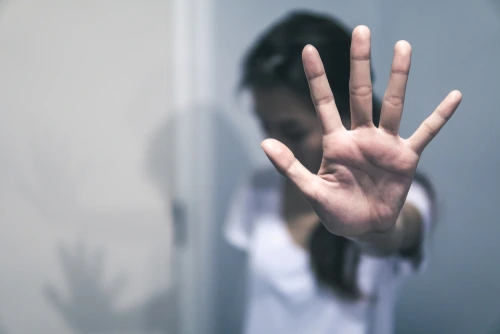
New data has shed light on the endemic public sexual harassment facing girls and young women in the UK, as campaigners push to make it categorised as a crime.

Data from Plan UK, drawn from a survey of girls and young women aged 12 to 21, found that 75% had experienced public sexual harassment.
Of those who had experienced public sexual harassment, the most common location was outside, such as in the street. Almost half had experienced public sexual harassment in an educational setting, and 37% had experienced it on public transport.
The racial disparity in public sexual harassment
But Plan UK’s research found that the experience wasn’t evenly distributed across all girls and young women, and there was a clear racial disparity among experiences of public sexual harassment. While 70% of Asian and Asian British girls and young women had experienced public sexual harassment, that proportion rises to 82% among black girls, and 88% among mixed-race girls.
“I was wearing a baggy jumper and really wide-leg jeans and a headscarf, and a guy shouted out of the window, ‘Your tits look big, under that massive jumper.’ I was wearing a headscarf as well; it is like modesty is not a cover,” said Huda, aged 19.
“Black women are often hyper-masculinised and there is this idea that we should be able to fend for ourselves,” said Alicia, aged 19. “[There is] the idea of the ‘strong black women’, yet at the same time we are the most vulnerable and we are the most sexualised. We are the most exposed and least protected.”
Some 44% of mixed-race girls had experienced unwanted touching in public, and 15% had experienced being flashed. In comparison, 25% of white girls had experienced unwanted touching, and 11% had experienced being flashed.
Lack of faith in schools and police to tackle harassment
But the girls and young women said that they didn’t have faith in their schools and universities to properly deal with sexual harassment, especially when it intersects with race and religion. The interviewees also reported low trust in the police, worsened by the stories of cases such as “Child Q,” who was strip-searched by police.
“I am brown, I am a Muslim; are they actually going to ever believe me?” said Jasmine, aged 19. “No, the police don’t stand to serve people like me. They’re against people like me.”
They also said that teachers and police don’t understand their cultural backgrounds, which may make it difficult to get support from parents and families in cases of sexual harassment.
“Of course, you are not going to go to the police who are over-policing you,” said Alicia. “They don’t have measures in place, they are not aware of your cultural beliefs, like why calling your parents up is not safe for everyone.”
[Read more: Period poverty: London has the highest proportion of girls struggling to afford menstrual products]






